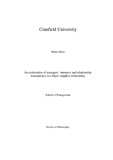JavaScript is disabled for your browser. Some features of this site may not work without it.
| dc.contributor.advisor | Mena, Carlos | |
| dc.contributor.author | Bastl, Marko | |
| dc.date.accessioned | 2012-06-25T09:27:12Z | |
| dc.date.available | 2012-06-25T09:27:12Z | |
| dc.date.issued | 2011-12 | |
| dc.identifier.uri | http://dspace.lib.cranfield.ac.uk/handle/1826/7274 | |
| dc.description.abstract | The problem explored in this thesis falls under a broad topic of information sharing in a buyer-supplier relationship. Responding to the empirically underexplored state of extant literature on information sharing, this study aims to gain a better understanding of the factors that influence managers to engage in information sharing as an activity, as well as the factors influencing information sharing as an outcome and its consequences in a buyer-supplier relationship. In this way, this study acknowledges a conceptual separation between information sharing as an activity (i.e. a manager’s openness) and information sharing as an outcome (i.e. relationship transparency), and treats a manager as embedded in an external, wider interaction environment (e.g. buyer-supplier relationship). The study adopts a qualitative, exploratory approach, utilising a case-based research strategy. The empirical study is based on a pilot and two main cases. The main interviews were carried out on the suppliers’ side of two buyer-supplier dyads. In total, the empirical work consisted of 45 semi-structured interviews with 32 managers. Based on the empirical work, the thesis develops two models: the contingencies model, which captures the influencing factors of a manager’s openness and relationship transparency, and the consequences model, which captures the consequences of relationship transparency. In so doing, the thesis makes three primary theoretical contributions. First, captured in the contingencies model, it shows that a manager’s openness is influenced by the interplay of a number of individual-level factors, where managers’ trust and risk taking behaviours play a central role as well as through an external interaction environment. Second, the same model suggests that information quality alone is not enough to foster relationship transparency and that other factors, such as trustworthiness of information source and a recipient’s knowledge, should also be considered. Third, the thesis also identifies a number of consequences of relationship transparency, which are captured in the consequences model, and highlights the role of the external context an understanding of those consequences. In this way, the study marks a step forward towards increasing the understanding of information sharing as an activity and as an outcome, while considering an individual manager as part of a wider interaction environment. | en_UK |
| dc.language.iso | en | en_UK |
| dc.publisher | Cranfield University | en_UK |
| dc.rights | © Cranfield University 2011. All rights reserved. No part of this publication may be reproduced without the written permission of the copyright holder. | en_UK |
| dc.title | An exploration of managers' openess and relationship transparency in a buyer-supplier relationship | en_UK |
| dc.type | Thesis or dissertation | en_UK |
| dc.type.qualificationlevel | Doctoral | en_UK |
| dc.type.qualificationname | PhD | en_UK |
